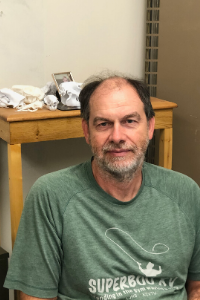
Meet Maine-eDNA Researcher: Gerard Zegers
By Attis Bielecki, ME EPSCoR Student Writer

Gerard Zegers is a Biology Professor at the University of Maine at Machias who conducts his research under the Maine-eDNA program. With his PhD in Biology, Zegers leads a group of undergraduate and graduate students, serving as an advisor and instructor for these students as well. His role within the Maine-eDNA program is overseeing index site sampling in the Downeast Maine area; specifically, in places like Gardener Lake, Chase Mills Stream, and Bucks Harbor.
Index sites are an important part of the Maine-eDNA program, where students at both the graduate and undergraduate level are taught to collect water samples on a monthly basis. The water samples themselves contain environmental DNA (eDNA), and are being used to create a five-year index of aquatic and marine life, primarily in coastal Maine areas. This index site sampling effort will eventually produce a comprehensive reference database containing genetics data for freshwater and marine life forms in Maine’s freshwater and marine ecosystems.
“In terms of our focus in 2021 in Eastern Maine, we’re using this [index site sampling] to develop markers for Microgadus tomcod [Atlantic Tomcod] and hopefully before the end of the year, we’ll also be looking at alewives,” Zegers said.
With the Tomcods, Zegers hopes to work with the Downeast Salmon Federation (DSF), which facilitates a citizen science monitoring program. Pairing up with DSF will allow Zegers to collect more data as the organization goes out into the field to sample tomcod in streams. That sampling is planned to occur in December because that is the natural spawning season for tomcod.
“These are just a few of the projects that Maine-eDNA supports through the index site sampling effort. We are training students and teaching them about eDNA collection, sequencing, and analyses,” Zegers explained. “The work is coming along nicely. The students are getting that much-needed lab experience and building connections they would not normally develop on their own.”
This research provides valuable resources to the University of Maine at Machias campus. “While the University of Maine at Machias does a lot of teaching, we are always looking for opportunities to expand research driven, hands-on experiential learning,” Zegers pointed out. “So, with this National Science Foundation sponsored program reaching into this part of Maine, it allows students here to be direct participants in the effort.”
Zegers’ work highlights how federal research can impact communities across the state, providing a starting point for many students interested in biology, and growing research programming at the University of Maine at Machias.
